-
The Connection Between Oral Health and Systemic Diseases
The Impact of Oral Health on Your Overall Health
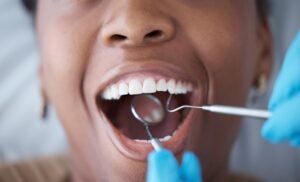 For years, scientists have been studying the link between oral health and overall health. While research is still ongoing, there are certain connections that are now well-documented. For example, significant associations have been found between periodontal disease and conditions like diabetes, cardiovascular disease, and kidney disease. The common thread linking these diseases is inflammation, and chronic low-level inflammation contributes to oral issues and issues like heart disease, cancer, and cognitive decline. Understanding these connections underscores how important it is to maintain good oral health, in order to promote overall well-being.
For years, scientists have been studying the link between oral health and overall health. While research is still ongoing, there are certain connections that are now well-documented. For example, significant associations have been found between periodontal disease and conditions like diabetes, cardiovascular disease, and kidney disease. The common thread linking these diseases is inflammation, and chronic low-level inflammation contributes to oral issues and issues like heart disease, cancer, and cognitive decline. Understanding these connections underscores how important it is to maintain good oral health, in order to promote overall well-being.
Continue reading “The Connection Between Oral Health and Systemic Diseases” -
Oral Benefits of Saltwater Rinse
Mouthwash or Saltwater?
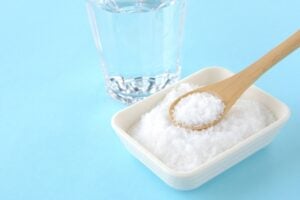 Do you use mouthwash? It is effective in freshening breath and cleaning areas you can’t reach by simply brushing and flossing. However, if you want a rinse that addresses a wider array of oral concerns, a saltwater rinse might be a better bet. Saltwater is known for its healing properties, and rinsing with saltwater can even positively impact your respiratory health. Here, we take a look at the benefits of incorporating a saltwater rinse into your oral health routine.
Do you use mouthwash? It is effective in freshening breath and cleaning areas you can’t reach by simply brushing and flossing. However, if you want a rinse that addresses a wider array of oral concerns, a saltwater rinse might be a better bet. Saltwater is known for its healing properties, and rinsing with saltwater can even positively impact your respiratory health. Here, we take a look at the benefits of incorporating a saltwater rinse into your oral health routine.
Continue reading “Oral Benefits of Saltwater Rinse” -
What Are All-on-4 Dental Implants?

All-on-4 dental implants are a groundbreaking option for those who have lost all or most of their teeth. This dental procedure offers a stable and long-lasting alternative to traditional dentures, providing both functionality and aesthetics. Understanding what All-on-4 dental implants are and how they work can help those considering this option make an informed decision.
Continue reading “What Are All-on-4 Dental Implants?”
-
The Connection Between Snoring and Your Dental Health

Snoring affects millions of people worldwide. While it is often regarded as a minor inconvenience, snoring can sometimes signal underlying health problems, including those related to dental health. Understanding the connection between snoring and dental health can help you deal with the root causes and improve your overall well-being.
Continue reading “The Connection Between Snoring and Your Dental Health”
-
Social Media and the Rise of Veneers: A Perfect Smile Revolution

In the age of video calls and selfies, where every smile is under the scrutiny of high-definition cameras and social media’s ever-watchful eye, the quest for the perfect smile has taken on new significance. Among the most popular cosmetic procedures to achieve that flawless look are dental veneers. These custom-made shells cover the front of the teeth, improving their appearance by altering the color, shape, size, or length. The surge in the popularity of veneers coincides with the rise of social media and the influence of digital culture on personal aesthetics.
Continue reading “Social Media and the Rise of Veneers: A Perfect Smile Revolution”
-
The Ultimate Guide to Tackling Tooth Sensitivity
Understanding and Managing Tooth Sensitivity
Tooth sensitivity is a common dental issue that affects many people worldwide. It’s defined by a sharp pain or discomfort in the teeth when exposed to certain stimuli, including cold, hot, sweet, or acidic foods and drinks. The sensation can be temporary or chronic, but regardless of its duration, it significantly impacts one’s quality of life. This guide aims to provide comprehensive insights into the causes of tooth sensitivity and offer practical solutions to manage and reduce it effectively. Continue reading “The Ultimate Guide to Tackling Tooth Sensitivity”
-
A Guide to Understanding Dental Insurance
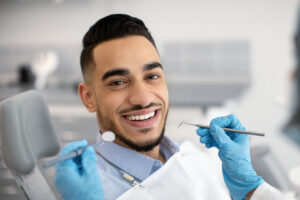
Man using his dental benefits to visit dentist
Understanding Dental Insurance
Dental insurance is a critical component of healthcare that often goes underappreciated until the need arises for routine cleanings, unexpected fillings, or more significant procedures like crowns and bridges. Understanding the intricacies of dental insurance can save you from unexpected expenses and help you maximize the benefits you’re entitled to. This guide, drawing from a comprehensive overview of dental insurance basics, aims to clarify the subject and provide practical advice for navigating dental insurance plans effectively.
Understanding the Basics
Dental insurance functions similarly to health insurance but is specifically designed to cover dental care. Plans typically cover preventive services such as exams and cleanings, basic procedures like fillings, and more complex treatments including root canals and crowns. Understanding your plan’s structure—monthly premiums, annual maximums, deductibles, and copays or coinsurance—is essential for making informed decisions about your dental care.
Key Terms Explained
Navigating dental insurance requires familiarity with several key terms:
In-Network vs. Out-of-Network: Choosing in-network providers can significantly reduce out-of-pocket costs, thanks to negotiated rates.
Coverage Tiers: Dental services are often categorized into preventive, basic, and major services, each with varying levels of coverage.
Waiting Periods: Some plans impose waiting periods before certain benefits can be utilized, affecting when you can receive specific treatments.
Maximizing Your Benefits
To get the most out of your dental insurance:
Stay In-Network: Opt for providers within your plan’s network to enjoy lower rates.
Regular Preventive Care: Leverage your plan’s coverage for preventive care to maintain oral health and detect issues early.
Understand Your Plan: Familiarize yourself with the details of your coverage, including limitations and exclusions, to avoid surprises.
Choosing the Right Plan
Picking the right dental insurance plan requires consideration of your dental health needs, budget, and the plan’s coverage specifics. Plans vary in terms of monthly premiums, deductibles, annual maximums, and coverage details for different types of dental care. Whether it’s a PPO, which offers flexibility in choosing providers, or a DMO, which typically offers lower costs but requires you to stay within a network, understanding the differences is crucial.
Practical Considerations
Costs: Dental insurance can significantly reduce out-of-pocket expenses for dental care, but it’s important to compare the costs of premiums against potential out-of-pocket savings.
Eligibility: Dental insurance is accessible to individuals regardless of employment status, with options available for students, part-time workers, and those in transition.
Timing: Unlike health insurance, dental insurance can often be purchased at any time, providing flexibility for those needing immediate coverage.
Stay Informed
A thorough understanding of dental insurance not only helps in selecting the right plan but also ensures that you can make the most of your benefits while minimizing out-of-pocket expenses. Regular reviews of your dental insurance plan, staying informed about the coverage and exclusions, and making strategic decisions about dental care can lead to significant savings and a healthier smile.
Park 56 Dental is here for you in New York, delivering top-quality care since 1997. Our expert team offers a wide range of treatments from pediatric to sedation dentistry, ensuring personalized care for every patient. Experience the difference with a complimentary consultation where we’ll address your sensitivity concerns and guide you toward the best treatment options. Enjoy a comfortable dental visit with our modern practice and diverse insurance plan acceptance. Schedule with us today online or at 646-679-3973 and take the first step toward tackling tooth sensitivity with confidence!
-
Why it’s Important to Maintain your Gum Health
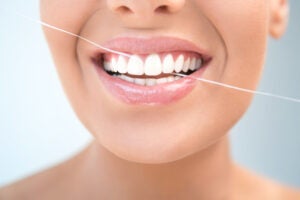
Woman flossing teeth.
Welcome to the Park 56 Dental blog, where we believe that a healthy smile starts with healthy gums! As specialists in dental care, we understand the vital role that gum health plays in maintaining overall oral health. While often overlooked, your gums provide the foundation for your teeth, ensuring they stay securely in place and function properly. In this blog post, we will be delving into why it is so crucial to prioritize gum health and the various steps you can take to keep your gums in excellent condition. No matter your age or current oral health status, we hope you find the information shared here helpful and empowering to take charge of your gum health. Let’s get started on this journey towards a vibrant and healthy smile that starts from within!
Warning Signs of Tooth Decay
Tooth decay is a common problem that results from bacteria in your mouth producing harmful acids that erode your enamel. But did you know that one of the earliest warning signs of tooth decay is actually gum problems? As the bacteria spreads, it can cause your gums to become red, swollen, and prone to bleeding. This is a sign that you should schedule a cleaning with your dentist as soon as possible.
Dental Care for Seniors: Addressing Age-specific Oral Health Challenges
As we age, our dental needs change. Seniors are more likely to suffer from gum problems due to some of these common problems/triggers:
- Dry Mouth: One of the most common oral health issues that seniors face is dry mouth. This is often caused by medications that reduce salivary flow or medical conditions such as Sjögren’s syndrome. Dry mouth can cause a range of problems, including tooth decay, gum disease, and oral infections.
- Gum Disease: Seniors are at an increased risk of developing gum disease, which is caused by a buildup of bacteria in the mouth. Gum disease can lead to tooth loss and other health problems, including heart disease and stroke.
- Tooth Loss: As we age, our teeth may begin to wear down, crack, or decay. Eventually, tooth loss may occur. Missing teeth can cause difficulty eating and speaking and may even lead to bone loss in the jaw.
- Oral Cancer: Seniors are at an increased risk of developing oral cancer, particularly if they smoke or use tobacco products. Oral cancer can be difficult to detect in its early stages, which is why it is important for seniors to receive regular oral cancer screenings.
- Medication Side Effects: Seniors may take a range of medications to manage medical conditions, and some of these medications can cause side effects that affect their oral health. For example, some medications can cause dry mouth, while others can cause gum inflammation or mouth sores.
The Hidden Dangers of Not Addressing Dental Problems
Gum disease doesn’t just affect your mouth. Studies have found that people with gum problems are more likely to develop heart disease, stroke, and other systemic conditions. This is because the bacteria that cause gum disease can enter your bloodstream and spread to other parts of your body, including your heart and lungs. That’s why it’s crucial to address gum problems early on to avoid these serious health risks.
Simple Ways to Prevent Gum Disease
Preventing gum disease doesn’t have to be difficult. By following a few simple steps, you can keep your gums healthy and your smile bright. First, make sure to brush your teeth twice a day with fluoride toothpaste. Second, floss each day to remove plaque and bacteria from between teeth and along the gumline. Finally, make sure to visit your dentist regularly for cleanings, exams, and x-rays. Taking these steps can go a long way toward avoiding gum disease and other dental problems.
Reach Out to Park 56 Dental Today with Any Questions
Keeping your gums healthy is a vital part of maintaining good oral health and avoiding serious medical problems. If you’re experiencing gum disease symptoms such as bleeding, redness or swelling, consult your dentist right away. At Park 56 Dental, we offer a full range of preventative and restorative services designed to keep your gums and teeth healthy for life. To schedule an appointment, call us at (212) 826-2322 today.
-
Oral Hygiene Tips for Busy Professionals

Woman travelling
A Busy Schedule Can Get in the Way of Self-Care
When you’re a busy professional, keeping up with a hectic, fast-paced schedule, it’s easy to put self-care on the back burner. So many things demand your time and attention, whether you’re traveling or just living your life, that you may have trouble keeping up with things that are important to your health. One thing you should never neglect, though, no matter how busy life gets, is your oral health. Here, we offer some tips for busy professionals, to help you keep up with your oral hygiene.
Caring for Your Teeth at Home
Brush your teeth at least twice a day, for a minimum of two minutes each time. Using a soft-bristled brush with a small head and flexible neck, brush your teeth gently in a circular motion, with your brush at a 45 degree angle to the gum line. Start at the back of the mouth, working systematically and taking care to brush along the inner, outer, and chewing surfaces. Brush your tongue to remove bacteria from your mouth, and don’t forget to floss at least once a day. Wait for a few seconds after brushing to rinse so that fluoride has a chance to sit on your teeth. Limit in-between meal snacking, watch your sugar intake, and choose water over fruit juice or sweetened drinks.
Dental Care on the Go
Whether you’re traveling or just racing between appointments, prepare ahead of time to care for your teeth on a busy day. Carry a floss travel pack in your bag or wallet, and bring along some fresh, crunchy, fibrous vegetables like celery, carrots, and cucumbers. These foods have a high water content, which helps to balance the pH level of your mouth, and eating them helps scrape debris from your teeth in the middle of a hectic day when you don’t have time to brush. If you are traveling, clean the inside of your toiletries bag before packing your toothbrush, and let your toothbrush air dry whenever possible, to prevent the growth of microbes. Alternately, consider using disposable toothbrushes so that you know you always have a clean one. If you’re visiting a location where the water isn’t trustworthy, brush your teeth using bottled water.
Amping Up Your Efforts
If being pressed for time is a frequent problem for you, consider investing in an electric toothbrush. Electric toothbrushes have smaller heads, to get into tight spaces more easily, and the rotating brush effectively removes plaque from your teeth. Some can elan your teeth thoroughly in as little as 15 seconds, so that can shave a few minutes off of your daily routine. No matter which kind of toothbrush you use, replace it every two to three months, or immediately after you’ve been ill. If you find you need to replace your toothbrush more frequently than that, you may be applying too much pressure when you brush. Talk to your dentist about improving your technique so that you can keep your mouth clean without damaging your gums and tooth enamel.
Finding the Very Best Dentist
Perhaps the most important part of caring for your dental health is finding a dentist and keeping regular dental appointments to keep your mouth clean and catch any issues before they become serious- and time consuming. If you’re looking for a dentist in New York, why not choose the dentist voted best in the city? At Park 56 Dental Group, we offer pediatric, prosthodontics, endodontics, oral surgery, Invisalign®, emergency, and sedation dentistry, all at the highest level of treatment. We serve the Midtown, Central Park, Upper East Side, Park Avenue, and all surrounding Manhattan and New York areas, with a patient-centered practice that has hours to fit your schedule. Schedule your complimentary consultation today by contacting us online or calling us at (212) 826-2322.
-
How to Choose the Right Toothpaste for Your Unique Dental Needs
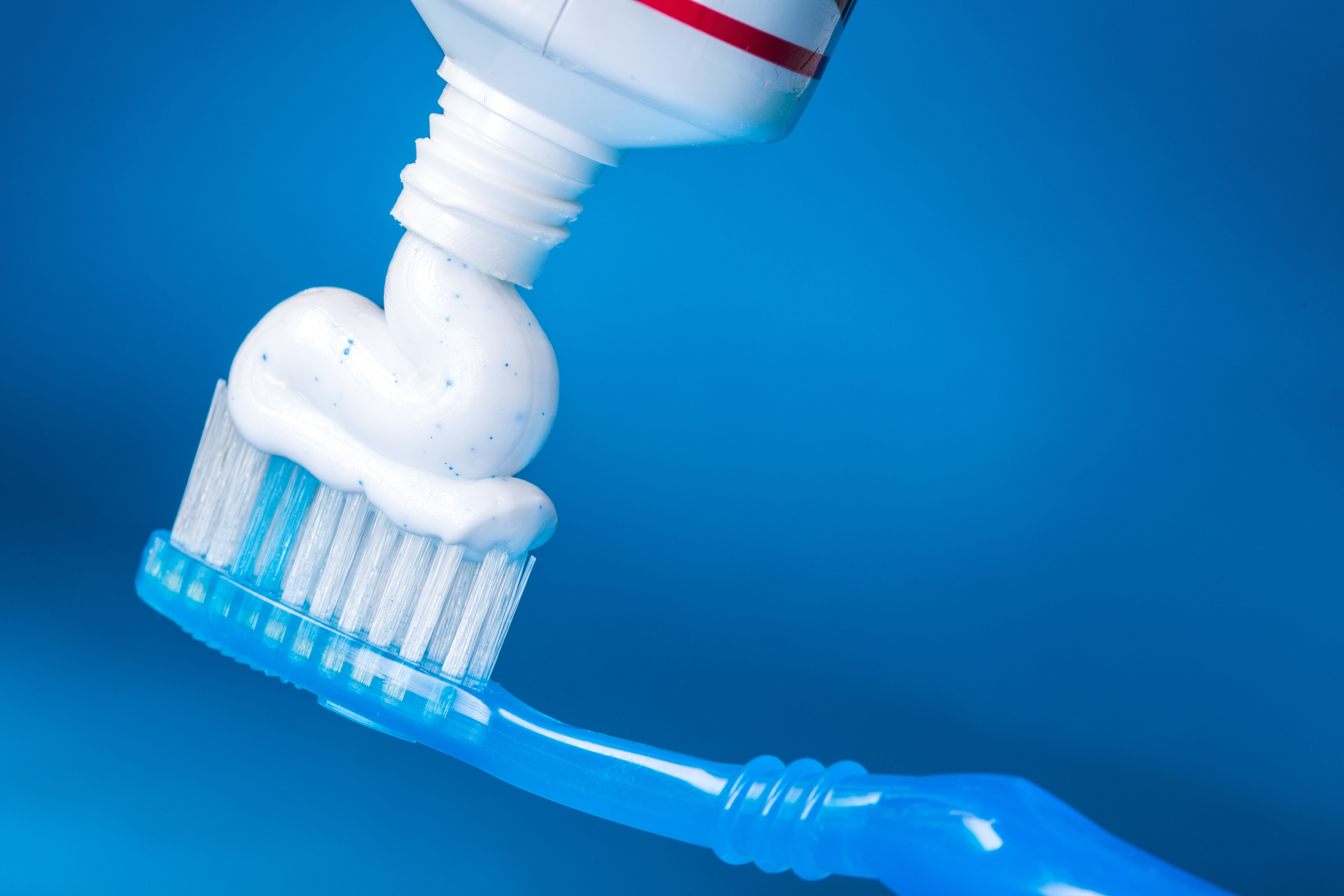
Picking the right toothpaste
How hard can it be to choose a toothpaste?
How do you go about choosing a toothpaste? It seems like it should be easy! Once you get to the store, though, it’s easy to be overwhelmed by all the options. With so many toothpastes from which to choose, how do you pick the right one? Here, we offer some helpful tips for choosing the right toothpaste for your unique dental needs.
Know the Basics
Toothpastes contain abrasive agents, flavoring agents, detergents, humectants, and detergents, and are available in gel, paste, powder, or tablet forms. There are two important things to look for in a toothpaste: fluoride and the ADA seal of approval. Fluoride has been proven to protect against tooth decay and help to remineralize teeth, and the ADA (American Dental Association) must verify that a product is effective before that product can display the seal of approval.
Evaluate Your Dental Needs
Think about what you want a toothpaste to accomplish for you beyond just cleaning your teeth. Some common concerns include bad breath, sensitive teeth, plaque, gum disease, tartar, and yellowing teeth. Once you have assessed what you need, look for a toothpaste that fits with your concerns.
- Preventing cavities: Fluoride is a major factor in preventing cavities and strengthening enamel. Choose a toothpaste with mild abrasives, like hydrated silica or calcium carbonate, to remove plaque and surface stains without damaging enamel.
- Tartar control: Bacteria can cause biofilm on the teeth, and this can lead to plaque. When biofilm traps salivary calcium and phosphate, it crystallizes into tartar, also called calculus. While this is removed by the dental hygienist during your cleanings, it can be helpful to use a tartar control toothpaste in between visits. These toothpastes typically contain ingredients like zinc citrate and triclosan.
- Sensitivity: Dental pain is typically due to dentin hypersensitivity. Toothpastes with potassium and fluoride can help with sensitivity, as can toothpastes with strontium chloride, calcium carbonate, or arginine. Using desensitizing toothpaste for at least eight weeks can help reduce dental pain.
- Gum disease prevention: Toothpaste with ingredients that have antibacterial properties, like triclosan or stannous fluoride, can help prevent gum disease by reducing plaque and gum inflammation.
- Controlling bad breath: Brush your teeth for two to three minutes, at least twice a day, with a fluoride toothpaste. Brush your tongue from back to front, or use a tongue scraper. Baking soda can be effective for eliminating halitosis (bad breath), either in a baking soda toothpaste or on its own.
- Whitening teeth: There are several whitening toothpastes on the market, with bleaching ingredients like silica, pyrophosphates, and hydrogen peroxide. Hydrogen peroxide is a good option because it is gentle and won’t cause irritation in your mouth. If you do experience any uncomfortable symptoms, contact your dentist.
Choosing a Toothpaste for Children
Children over age six typically use adult toothpaste. Before that, as long as the toothpaste meets the fluoride and ADA seal requirements, you can choose a fun toothpaste for your children, to encourage them to brush frequently. Look for fun flavors, sparkles and swirls, or toothpaste in a container decorated with fun characters or superheroes. Make sure, though, that you teach children to spit out the toothpaste instead of swallowing it, because ingesting toothpaste can lead to chronic fluorosis for kids.
Partner with the Dentist Voted Best in New York
If you’re looking for a dentist in New York, why not choose the dentist voted best in the city? At Park 56 Dental Group, we offer pediatric, prosthodontics, endodontics, oral surgery, Invisalign®, emergency, and sedation dentistry, all at the highest level of treatment. We serve the Midtown, Central Park, Upper East Side, Park Avenue, and all surrounding Manhattan and New York areas, with a patient-centered practice that has hours to fit your schedule. Schedule your complimentary consultation today by contacting us online or calling us at (212) 826-2322. For more dental advice, check out our other blogs!
RECENT POSTS
categories
- Uncategorized
- Cosmetic Dentistry
- Veneers
- Healthier Teeth
- Teeth Whitening
- Dental Health
- Video
- Dental Emergencies
- Invisalign
- Dental Implants
- Root Canal
- Sedation Dentistry
- Infographic
- Dental Crowns and Bridges
- Dental Anxiety
- Gum Disease
- COVID-19
- Bad Breath
- New York Dentist
- Cut out sugar
- General Dentistry
- Oral Health
- Oral Cancer
- Dry Mouth
- Gum Health
- Toothache
- Dental Sealants
- Cavities



